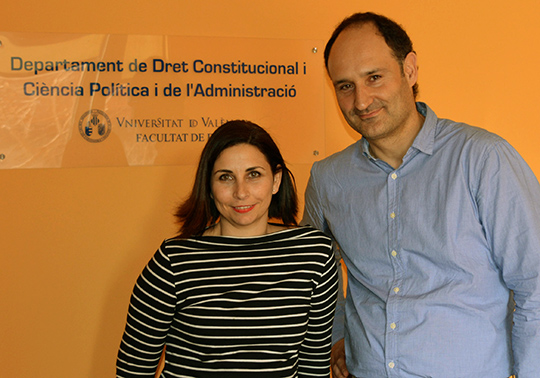A study highlights the singularity of Ciudadanos as a Spanish political party due to its Catalonian origin
- March 14th, 2017

The Catalonian origins of Ciudadanos turn them into the first party of the national level characterysed by a new model of no centralist Spanish nationalism whereas in Catalonia the group of Albert Rivera is the main reference for the sectors which are opposed to independence. These are two of the contributions of Astrid Barrio and Juan Rodríguez Teruel, professors in the Universitat de València. They also affirm in an article that the orange party is succesfully concluding its institutionalisation process.
The research highlights that the electoral base of Ciudadanos (C’S) comes largely from the centre-right (the 40% were ancient voters of UpyD and the 12% have previously voted PP) and from the abstention or the blank vote (8’4%). However, the analysis identifies C’s as a party of centrist orientation, which defines itself as ‘liberal when it comes to economics and progressive in the social aspect’ which could already have an electoral growth in the centre-right to the detriment of PSOE.
The experts highlight that the possibility of winning ancient socialist voters is hampered by the recent C’s decision of refusing social democracy in its ideological definition. This measure was passed in the General Assembly that the party celebrated at the beginning of February in Madrid. It is a ‘centrist position framed in its institutionalisation process’, according to researchers. ‘Perhaps, the renounce to the references to socialism, apart from the fact that it is an electoral space with more competence, it fives more coherence to its international assignment since in the European Union, the orange party is a part of the Alliance of Liberals and Democrats for Europe Group (ALDE)’, explain Barrio and Rodríguez, professors of the Faculty of Law.
This determination of the party directed by Albert Rivera is the last evolution movement of a political force which is still getting used to the routines of the national politics. In this way, ‘Ciudadanos is immersed in an institutionalisation phase upon which its stability depends, although its origins date back to 2006, year in which it was founded in Catalonia as an autonomous political party which reacted to an particularly Catalonian issue.’
The authors highlight the political renovation and anti-corruption fight principles as well as a defence of transparency, the remodelling the public administrations and the depoliticisation of the judiciary as the main reason of this electoral growth in Spain from 2013. ‘C’s was born after a failure of the electoral marketplace in the national scope which comes from these unsatisfied demands of democratic regeneration’, affirms Barrio and Rodríguez. ‘It is an issue which remains being crucial for the party as shown by the fact that they have withdrawn support for PP in Murcia after the imputation of its president due to the Auditorio case.’
These demands, together with the cuts and the apparition of corruption cases, generate the great historical levels of political disaffection among the citizenship with regards to the institutions. ‘There were some demands which the traditional alternative parties such as UpyD and Izquierda Unida were not able to carry’, they affirm. ‘This was the perfect breeding ground for the establishment of the new parties (Ciudadanos and Podemos) in the national electoral scene’, according to researchers.
Ciudadanos in Catalonia
In their article, Barrio and Rodríguez also analyse the Catalonian context of Ciudadanos where the party has been represented for more than ten years in the parliament. They consider that this electoral success is based on an anti-nationalist speech which attracted voters to C’s. Most of them are Spanish-speaking voters who come from the metropolitan area of Barcelona, the more populated area of Catalonia. ‘Its campaign messages focused mostly on identity and linguistic issues, and their criticism to politics which aimed at building a national identity were the keys’.
The electoral growth of Ciudadanos in Catalonia was reactivated after the rebirth and the consolidation of the independence movement which help them becoming the main opposition power in the parliament in the regional Catalonian election in 2015. ‘This success is based on the fact that C’s defends the decentralisation model based on the ‘state of autonomies’, with a blind defence of the unity of Spain and a clear delimitation of the community powers and the elimination of the provincial administrations (Diputaciones)’ affirm the researchers.
One of the obstacles that the experts expected for the electoral stability of Ciudadanos was its institutionalisation. ‘It will be an essential condition for its sustainability in the Spanish electoral marketplace in the long-term,’ affirm the experts. ‘And in that process, it is essential to have a stable leadership in the party, in this case in Albert Rivera, but maintaining at the same time the intern democracy and the promotion of new leaders, such as Inés Arrimadas. The results of the last congress highlight that it is successfully overcoming the institutionalisation. However, it should also be able to implement its reformist agenda,’ explain Barrio and Rodríguez.
Article:
Juan Rodríguez Teruel & Astrid Barrio (2015) «Going National: Ciudadanos from Catalonia to Spain», South European Society and Politics. DOI: 10.1080/13608746.2015.1119646
















